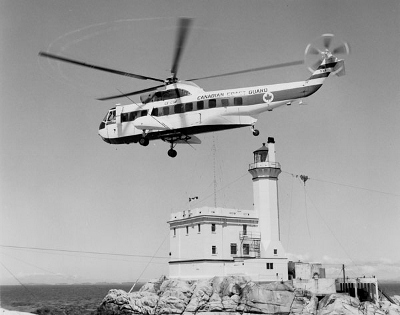Other Name(s)
Light Tower
Triple Island Light Tower
Phare de l'île Triple
Prince Rupert Lighthouse
Phare de Prince Rupert
Links and documents
Construction Date(s)
1919/01/01 to 1920/01/01
Listed on the Canadian Register:
2009/02/26
 Statement of Significance
Statement of Significance
Description of Historic Place
Built on a small, remote rock off the west coast of British Colombia, the Light Tower, also known as the Triple Island Light Tower, is a simple, tapered octagonal concrete shaft that supports a lantern. The Tower is attached to the eastern corner of a rectangular keeper’s dwelling. The designation is confined to the footprint of the building.
Heritage Value
The Light Tower is a Recognized Federal Heritage Building because of its historical associations, and its architectural and environmental values.
Historical Value
The Light Tower is associated with the establishment of permanent coastal navigational aids along the coast of British Columbia. It is one of the most northerly towers in Canada and it was constructed on one of the most challenging building sites for the Department of Marine and Fisheries.
Architectural Value
The Light Tower is based on a simplified, well-scaled, classical design. This tower in particular offers a good example of the expertise of Colonel Anderson, Chief Engineer at the Department of Marine and Fisheries. The design represents his last tower design, which featured more elaborate details than in previous concrete towers. It shows good quality craftsmanship as evidenced in the structure’s use of reinforced concrete, which was then a relatively new building medium.
Environmental Value
The Light Tower establishes the present character of the maritime setting and is well known to the local shipping community as a navigational landmark. It is the dominant component since it occupies almost the entire rugged, rocky islet on which it was built. In this remote maritime environment it exemplifies the concept of a tower rooted to a rock.
Source: Triple Island Lighttower, Triple Islet Group, British Columbia. Heritage Character Statement 96-092.
Character-Defining Elements
The following character-defining elements of the Light Tower should be respected.
Its simplified classical design and good quality materials and craftsmanship, for example:
- its form and massing which consist of a tall, slightly tapered octagonal tower with narrow slit openings, flared lantern platform, lantern and light;
- its sturdy construction of granite and formed concrete;
- its clean lines, subtle ornamentation and picturesque silhouette;
- the painted shingles cladding the tower;
- the interior hardwood column and stairs.
The manner in which the Light Tower establishes the picturesque, maritime coastal setting and is a well-known navigational landmark as evidenced by:
- its highly visible location atop a rugged, rocky site.
 Recognition
Recognition
Jurisdiction
Federal
Recognition Authority
Government of Canada
Recognition Statute
Treasury Board Heritage Buildings Policy
Recognition Type
Recognized Federal Heritage Building
Recognition Date
1997/03/26
 Historical Information
Historical Information
Significant Date(s)
n/a
Theme - Category and Type
Function - Category and Type
Current
Historic
- Transport-Water
- Navigational Aid or Lighthouse
Architect / Designer
n/a
Builder
n/a
 Additional Information
Additional Information
Location of Supporting Documentation
National Historic Sites Directorate, Documentation Centre, 5th Floor, Room 89, 25 Eddy Street, Gatineau, Quebec
Cross-Reference to Collection
Fed/Prov/Terr Identifier
7819
Status
Published
Related Places

Triple Islands Lighthouse
The Triple Islands Lighthouse is an octagonal, reinforced concrete tower measuring 23 metres (76 feet) high. It is attached to the corner of a square, three-storey, reinforced…